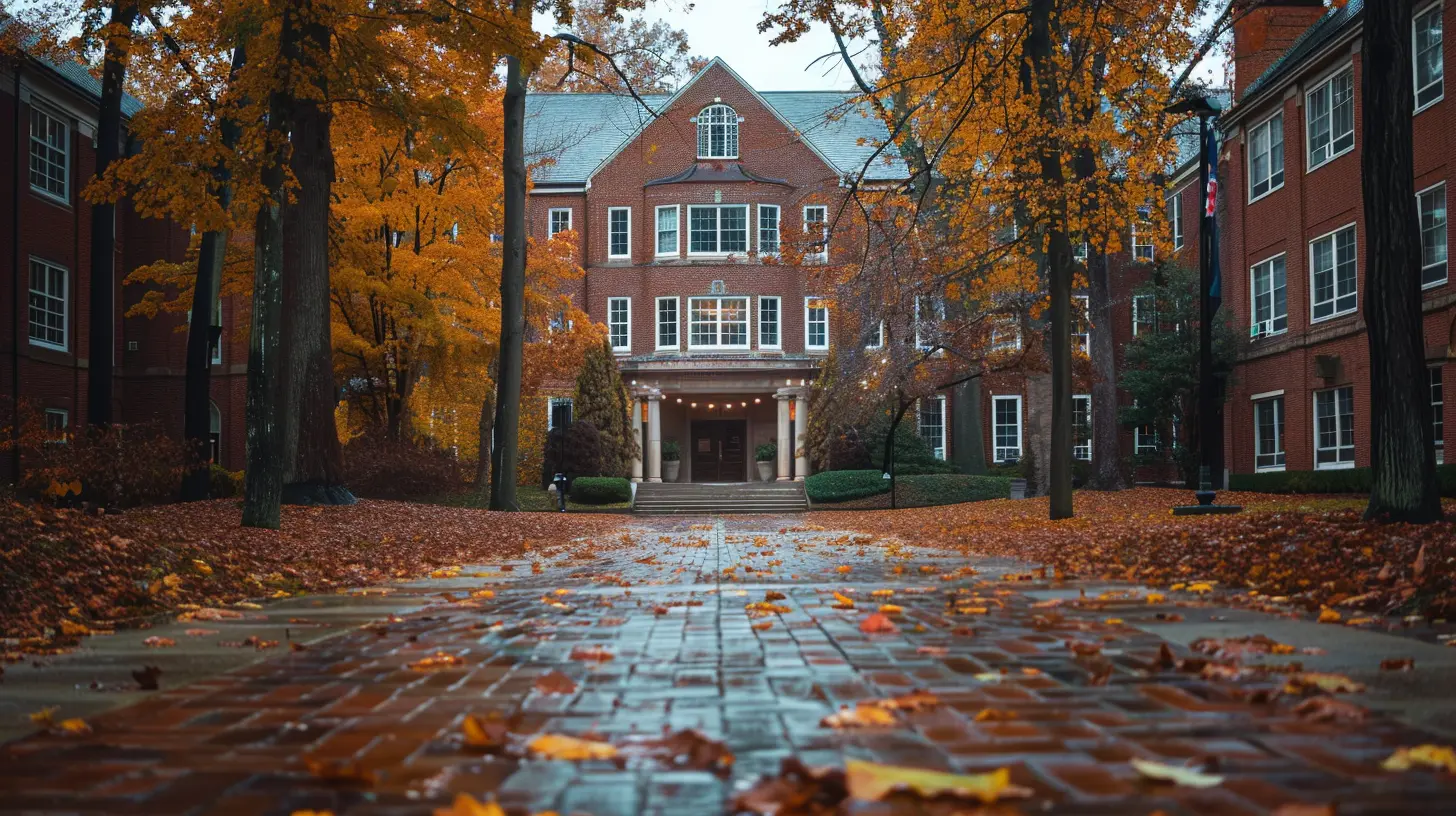The Importance of Academic Advising in Higher Education
22 September 2025
Let’s face it—navigating college can sometimes feel like trying to read an ancient treasure map without a compass. There are twists, turns, and detours galore. So, what’s the secret weapon that helps students sail smoothly through the stormy seas of higher education? You guessed it: academic advising.
Think of academic advisors as the GPS for your college journey. They're not there to tell you where to go, but they help you get where you want to be—without ending up in a ditch called “wasted credits” or “missed graduation requirements.”
So let’s unpack why academic advising isn’t just a nice-to-have—it's a must-have for every student dreaming of tossing their graduation cap high into the sky.

What Is Academic Advising Anyway?
Let’s start with the basics. Academic advising is a personalized support system where students meet with trained advisors who help them make the best choices for their academic and career goals.It's kind of like having a cheerleader, mentor, and friendly human-Google rolled into one. Academic advisors help students select courses, choose a major, stay on track for graduation, and even connect to campus resources.
But it’s not just about picking classes—it’s about building a roadmap to success.

Why It's a Game-Changer for Students
1. Guidance When You’re Feeling Lost
College campuses can feel like mini-cities with their own lingo, rules, and customs. It’s easy to get overwhelmed—especially if you’re the first in your family to go to college (shout-out to all the first-gen students!).Academic advisors act like tour guides who know every shortcut and hidden gem on campus. They point you in the right direction when you're unsure of your path or facing academic challenges.
Real Talk: Ever taken a course just because it “sounded cool” only to find out later it didn’t count toward your degree? Oof. An advisor could’ve saved you from that pitfall.
2. Helps You Stay on Track
Graduation requirements can be a hot mess. You’ve got gen eds, major requirements, electives, prerequisites—and don’t forget that one odd “capstone” course you've never heard of until senior year.Advisors help you design a clear path forward, semester by semester. No more last-minute surprises or missed credits. They make sure you’re checking all the boxes, so you cross that stage on time with zero regrets.
3. Course Planning Without the Headache
Ever felt like you needed a spreadsheet, a decoder ring, and a miracle just to plan your semester schedule? You’re not alone.Academic advisors are like the master Tetris players of higher education. They help you fit your classes together in the most efficient way—especially if you're juggling work, internships, or extracurriculars. Say goodbye to taking classes that don’t fit your goals or, worse, your schedule.
4. Major and Career Advice
Still unsure whether you should be a biochemist or a ballerina? Yup, advisors can help with that too.They’re trained to help you explore your strengths, interests, and career goals. They can even link you to career services, internships, and networking opportunities. Choosing a major isn’t just about picking what sounds cool; it’s about aligning it with your long-term vision—and advisors are your brainstorming buddies for that.
5. They’re Your Academic Safety Net
Life happens. Maybe you’re dealing with personal stuff, burnout, or struggling in a tough class. These moments can feel isolating—but here’s the thing: you don’t have to go through them alone.Academic advisors can connect you with tutoring, counseling, disability services, and even emergency financial aid resources. They’re like the Swiss Army Knife of student success—ready with the right tool for whatever you're facing.

Academic Advising Is More Than Just “Advising”
Let’s bust a myth: advising isn’t just about academics. It's about student development.Advisors encourage critical thinking, decision-making, and personal responsibility. They help students learn how to advocate for themselves, manage time, and make informed choices—skills that go way beyond the classroom.
Basically, they’re teaching you how to adult (without actually saying it that way!).

Different Types of Academic Advisors (Yes, There’s More Than One)
Not all advisors wear the same hat. Depending on your college or university, you might come across:- Faculty Advisors: Often professors in your major; great for career and field-specific advice.
- Professional Advisors: Staff members trained in academic policies and student support.
- Peer Advisors: Fellow students who’ve been in your shoes and can offer relatable advice.
- Specialized Advisors: Focused on honors programs, athletes, international students, or specific populations.
Each type brings something unique to the table. Don’t be afraid to meet with more than one!
When Should You See an Academic Advisor?
Spoiler alert: not just when you’re in trouble.Try scheduling regular “check-ins” at least once a semester. Treat advising like taking your car for an oil change—better to do it routinely than wait for smoke to come out of the engine.
Here are ideal times to book an advising session:
- Before the semester starts
- When planning your course schedule
- If you’re thinking of changing majors
- When you're struggling academically or personally
- As you prepare for graduation or grad school
How to Get the Most Out of Your Advising Sessions
Okay, you’ve decided to meet with an advisor (go you!). Now what?Here’s how to make it really count:
1. Come Prepared
Don’t just show up and say, “I dunno what I’m doing.” Bring questions, a draft schedule, or a list of goals. The more info you bring, the more tailored the advice you’ll get.2. Be Honest
If you’re overwhelmed, struggling, or even just unsure—that’s okay! Your advisor can only help if they truly know what’s going on. This is a judgment-free zone.3. Take Notes
You’ll get a lot of information. Jot down what they say or record the session (with their permission). Trust us—it’ll help more than you think.4. Follow Through
Advice is only good if you actually use it. Check your email. Register for the courses. Apply for that internship. The ball is in your court.Why Colleges Should Invest in Great Advising Programs
Let’s talk big picture for a second.Academic advising isn’t just helpful for students; it’s a huge asset for schools too. Strong advising programs improve retention, graduation rates, and overall student satisfaction. It’s basically a win-win.
When students feel supported, guided, and connected—they stick around. And when they succeed, colleges succeed.
That’s why more institutions are investing in:
- Lower advisor-to-student ratios
- Training programs for advisors
- Enhanced tech like degree audits and scheduling tools
- Holistic advising models that tie in career and wellness support
The Future of Advising: More Than Just a Desk Job
Advising is evolving. Today, it’s not just a transactional “course-picker” role—it’s transformational.Thanks to technology, students can now access virtual advising, chatbots, and 24/7 FAQs. But real human connections still matter most.
The best advising blends the digital with the personal—using data to guide strategy, but empathy to shape experience.
Final Thoughts: A College Secret Weapon Hiding in Plain Sight
Academic advising is like that ingredient in a recipe you didn’t realize made all the difference—until you taste it. It’s not flashy or loud, but it’s crucial.It empowers students to not just survive college, but thrive in it. It provides clarity in moments of confusion, direction in times of indecision, and support when it’s needed most.
So if you’re a student, don’t ghost your advisor—they’re literally paid to help you win. And if you're working in higher ed, champion those advising teams because they’re unsung heroes changing lives one appointment at a time.
### Now go book that advising session—you’ve got dreams to chase and degrees to earn.
all images in this post were generated using AI tools
Category:
Higher EducationAuthor:

Madeleine Newton
Discussion
rate this article
1 comments
Allegra Warner
Great insights! Academic advising truly makes a difference in navigating college life. It's like having a personal GPS for your educational journey, helping students find their best paths forward.
September 23, 2025 at 11:27 AM

Madeleine Newton
Thank you! I’m glad you found the insights valuable. Academic advising really is essential in guiding students toward success in their educational journeys.


